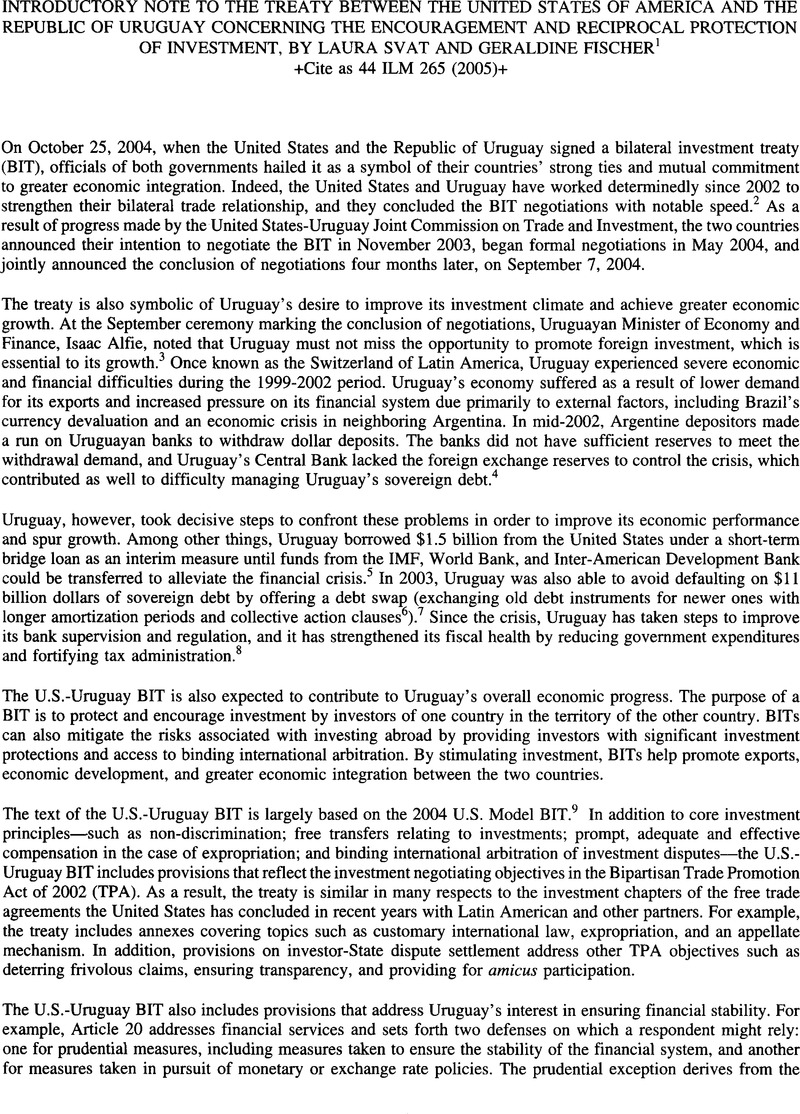Article contents
Treaty Between The United States of America And The Republic of Uruguay Concerning the Encouragement And Reciprocal Protection of Investment, by Laura Svat And Geraldine Fische*
Published online by Cambridge University Press: 27 February 2017
Abstract

- Type
- Treaties and Agreements
- Information
- Copyright
- Copyright © American Society of International Law 2005
Footnotes
This document was reproduced and reformatted from the text appearing at the USTR website (visited February 23, 2005) <http://ustr.gov/assetsAVorld_Regions/Americas/South_America/asset_upload_file440_6728.pdf>
References
Endnotes
1 Laura Svat is an Attorney Adviser in the Office of the Legal Adviser, U.S. Department of State and graduated from the University of Virginia School of Law and the Fletcher School of Law and Diplomacy. Geraldine Fischer is an Attorney-Adviser in the Office of the Chief Counsel for International Commerce, U.S. Department of Commerce and graduated from the American University Washington College of Law. The views expressed here are solely those of the authors and not necessarily those of any agency or of the U.S. Government.
2 In order to enter into force, legislative action on the part of both governments is also required. The United States Senate must provide its advice and consent to ratification by two-thirds vote (U.S. Const, art. II, § 2, cl. 2) and both chambers of Uruguay's General Assembly must approve the treaty by an absolute majority (Constitutión § 5, ch. 1, art. 85(7) (Uru.)).
3 El Pais Digital, “ Concluye tratado bilateral de inversiones,” Sept. 7, 2004, available at <http://www.elpais.com.uy/04/09/07/ultmo_109915.asp>
4 See Bureau of W. Hemisphere Affairs, U.S. Dep't of State, Background Note: Uruguay (Mar. 2005), available at <http://www.state.gov/r/pa/ei/bgn/2091.htm>
5 Press Release, John B. Taylor, The U.S. Commitment to Uruguay and Latin America Remarks at the Embassy of Uruguay on Receipt the “Medal of the Oriental Republic of Uruguay” (Feb. 14, 2005), available at <http://www.ustreas.gov/press/releases/js2250.htm>.
6 A collective action clause in a debt instrument enables a designated supermajority of the debt instrument's creditors to broker a debt structuring deal with the debtor to modify the bond's payment terms, and prevents minority holders from blocking the restructuring.
7 Alan Beattie, Uruguay Provides Test Case for Merits of Voluntary Debt Exchange, Fin. Times, Apr. 23, 2003, at 3.
8 Taylor, supra, note 5.
9 U.S. Model Bilateral Investment Treaty, available at <http://www.state.gov/e/eb/rls/othr/38602.htm> and <http://www.ustr.gov/Trade_Agreements/Bilateral/Section_Index.html>. For a summary of the U.S. Model BIT's substantive obligations, see Geraldine Fischer, Reviving the U.S. Bilateral Investment Treaty Program, The Int'l Lawyer (forthcoming 2005).
10 This defense, however, does not derogate from the obligations in Article 7 (Transfers) or Article 8 (Performance Requirements).
11 In any given case, the threshold is determined by the actual percentage required to modify the key payment terms of a single series of bonds in Uruguay's most recent (prior to the measures complained of) widely-distributed issue of external sovereign bonds, provided the bonds are also governed by New York law and permit such modification by holders of less than 100 percent of the aggregate principal of the outstanding debt. See U.S.-Uruguay BIT, Annex G, para. 2(b).
12 Press Release, United States, Uruguay Conclude Bilateral Investment Treaty (Sept. 7, 2004), available at <http://www.ustr.gov/Document_Library/Press_Releases/2004/September/United_States,_Uruguay_Conclude_Bilateral_Investment_Treaty.html>
1 Some forms of debt, such as bonds, debentures, and long-term notes, are more likely to have the characteristics of an investment, while other forms of debt, such as a bank account that does not have a commercial purpose and is related neither to an investment in the territory in which the bank account is located nor to an attempt to make such an investment, are less likely to have such characteristics.
2 For purposes of this Treaty, claims to payment that are immediately due and result from the sale of goods or services are not investments.
3 Whether a particular type of license, authorization, permit, or similar instrument (including a concession, to the extent that it has the nature of such an instrument) has the characteristics of an investment depends on such factors as the nature and extent of the rights that the holder has under the law of the Party. Among the licenses, authorizations, permits, and similar instruments that do not have the characteristics of an investment are those that do not create any rights protected under domestic law. For greater certainty, the foregoing is without prejudice to whether any asset associated with the license, authorization, permit, or similar instrument has the characteristics of an investment.
4 The term “investment” does not include an order or judgment entered in a judicial or administrative action.
5 “Written agreement” refers to an agreement in writing, executed by both parties, whether in a single instrument or in multiple instruments, that creates an exchange of rights and obligations, binding on both parties under the law applicable under Article 30(2). For greater certainty, (a) a unilateral act of an administrative or judicial authority, such as a permit, license, or authorization issued by a Party solely in its regulatory capacity, or a decree, order, or judgment, standing alone; and (b) an administrative or judicial consent decree or order, shall not be considered a written agreement.
6 For purposes of this definition, “national authority” means an authority at the central level of government.
7 For greater certainty, actions taken by a Party to enforce laws of general application, such as competition laws, are not encompassed within this definition.
8 For greater certainty,’ ‘Trips Agreement'’ includes any waiver in force between the Parties of any provision of the TRIPS Agreement granted by WTO Members in accordance with the WTO Agreement.
- 1
- Cited by


